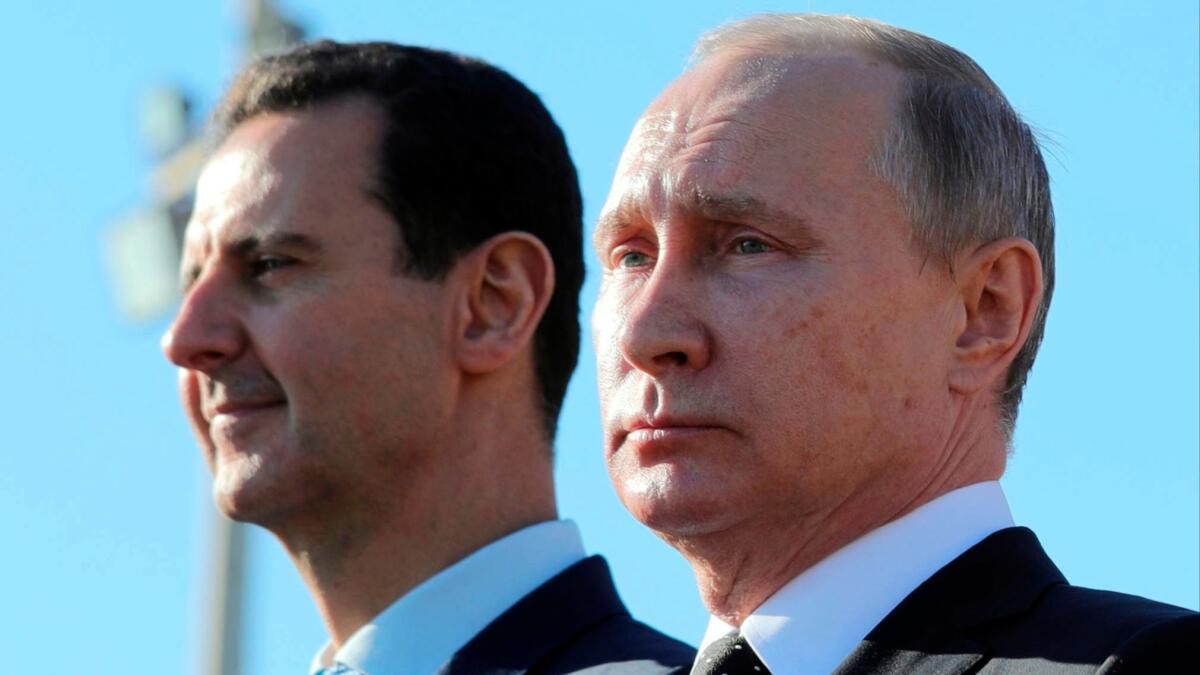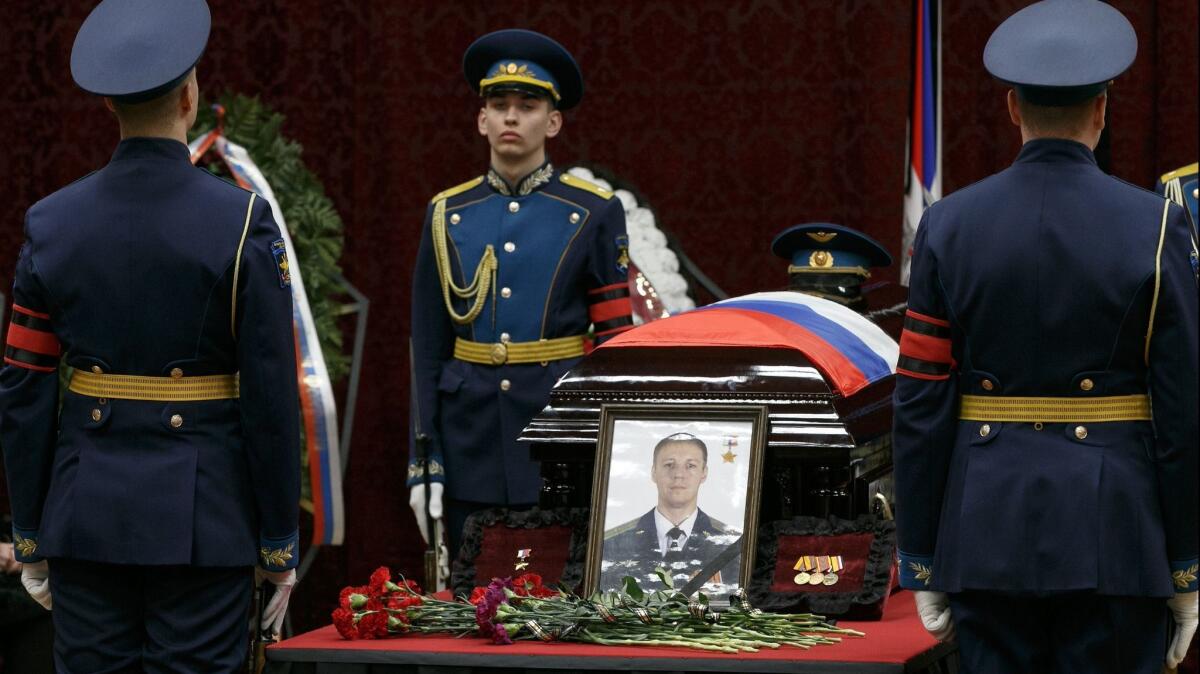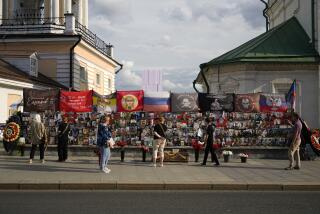Russia’s shadowy world of military contractors: independent mercenaries, or working for the Kremlin?

- Share via
Reporting from MOSCOW — Stanislav Matveev left his home in the Ural Mountains in September to join a Russian private military company. Five months later, Matveev was dead, killed in a U.S. airstrike on Feb. 7 in eastern Syria.
Matveev’s widow, Yelena Matveeva, wants answers from the Kremlin about why her husband is dead. By some accounts, scores of Russian contractors were killed.
“I’d like everyone to know about my husband,” she said in an interview with Znak, a Russian news site. “And not only about my husband, but about all the boys who died there so stupidly. Where were they sent to, and why? They didn’t even have protection, they were like pigs sent to slaughter!”
But just who sent them? There’s no easy answer.
The Ministry of Defense and the Kremlin do not officially associate with the private military companies, but media reports and researchers say they have pieced together enough evidence to suggest that the mercenaries are being employed, or at least directed, by the Russian military. The Kremlin denies this.
Little is known publicly about the military groups and how they operate, but they’ve gained a higher profile since the Feb. 7 airstrike in Syria. The U.S. said it was responding to an attack by hundreds of forces supporting Syrian President Bashar Assad near the Syrian city of Deir al Zor.
Russian media have reported that at least eight of those killed were Russian mercenaries, though some reports put the death toll at close to 200 — an assertion Maria Zakharova, spokeswoman for the Ministry of Foreign Affairs, dismissed as “misinformation” from the Western press.
“There were not 400, not 200, not 1,000, and not 10,” Zakharova said.
The government has confirmed five, but not eight, deaths, while stressing the men were not members of the Russian armed forces. According to interviews with family members of the eight identified, the mercenaries all were in Syria on contract with a private military company called the Wagner Group.
The company is believed to be organized by Dmitry Utkin, a former Ukrainian citizen who fought in eastern Ukraine on the side of the separatist rebels and later formed the Wagner Group in 2014. The group is named after Utkin’s nom de guerre.
Like Utkin, many of the Wagner fighters fought first in eastern Ukraine, where Russia-backed militias have been waging a separatist movement against Ukrainian forces since 2014.
Wagner has not been tied to reports of Russian meddling in U.S. elections, but investigative journalists at the St. Petersburg, Russia-based Fontanka news website have reported that one of Wagner’s sponsors is Yevgeny Prigozhin, a Kremlin-connected entrepreneur. Known as “Putin’s chef,” Prigozhin owns a St. Petersburg internet troll factory.
Both Prigozhin and the troll factory, the Internet Research Agency, were indicted Friday in the United States and charged with illegally using social media platforms to sow political discord in the U.S. Twelve other Russians associated with the troll factory and two Russian companies were also indicted.
The Ukrainian conflict has proven to be a steady source for Wagner’s recruitment. According to Russian media, most of the Wagner fighters killed in the U.S. airstrike on Feb. 7 also served at one point with the separatist rebels in eastern Ukraine.
Because private military companies are illegal in Russia, the company is registered in Argentina. Most military analysts estimate there are 2,000 mercenaries in Syria working for Wagner.
Yelena Matveeva said her husband, Stanislav, was home for about a year after fighting in the Donbass region in eastern Ukraine before telling her he was leaving on an unspecified mission. She told reporters she knew he had made contact with Wagner representatives while in eastern Ukraine.
Private military companies are not unique to Russia. Such companies provided services to the U.S. in Iraq and Afghanistan.
Whereas the Americans used mercenaries for security and stabilization after gaining and holding new territory, the Russians use mercenaries to fight the battles themselves, said Michael Kofman, a Russian military and security analyst with the Wilson Center, a think tank in Washington.
The use of mercenaries would help the Kremlin maintain plausible deniability of direct Russian involvement in conflicts, such as in Ukraine, and avoid public accounting for high casualty rates, said Vladimir Frolov, a Russian political analyst.
The Kremlin has denied also Western intelligence accusations that Russian troops have participated in the separatist fighting in the Donbass region.
When fighters of Russian origin have been captured or killed in eastern Ukraine, the Kremlin has called them volunteers or enlisted men “on vacation.” Military analysts in the West and Russia scoff at that characterization. Frolov said the government is likely coordinating the efforts of mercenaries in Syria as well.
“It is inconceivable for me to think that [the Russian mercenaries in Syria] are not tightly coordinated with the Russian military command,” he said. “Somebody supplies all their weapons and combat gear and fire support.”
In addition, the Fontanka investigation and other Russian researchers have found evidence that the mercenary groups have a “boot camp” in Russia’s southern Krasnodar region at a facility owned and operated by the Ministry of Defense.
“We don’t know concretely who is paying them, but they are supported, deployed and moved about by Russian military, so we can draw some conclusions from that,” said Kofman.
The way the Kremlin is handling the deaths of the mercenaries is beginning to wear on Russian families whose loved ones have been killed in a war that the Kremlin wants to paint as a low-impact conflict.
“Domestically, this is all bad press, and bad press a month and a half ahead of the election,” Kofman said.
Russia has a presidential election on March 18. It is widely expected that Vladimir Putin will win what will be his fourth term as president.

The Russian government’s response to mercenaries’ deaths has been a stark contrast with that of Maj. Roman Filipov, a pilot buried in Russia a day after the U.S. airstrike.
Rebels previously affiliated with Al Qaeda shot down Filipov’s Sukhoi-25 jet in Syria. The major managed to eject from the plane and parachute to the ground. Surrounded by insurgents, Filipov blew himself up with a grenade in order to avoid being captured.
Filipov’s story was covered widely on state media. More than 30,000 people attended his funeral. Putin posthumously awarded Filipov the title of Hero of Russia, the country’s highest honor.
It’s an honor Matveeva and other widows of mercenaries killed on Feb. 7 feel their loved ones deserve. “I want the government to avenge them,” she said. “I want the memory of the boys to stay with their wives, so that the children can be proud of their fathers.”
In a daily press call this month, Dmitry Peskov, the Kremlin spokesman, was asked by a reporter if there would be a day of mourning for the Russians killed in the Feb. 7 airstrike.
“Because of what? I don’t get why a mourning period needs to be declared,” Peskov said.
Ayres is a special correspondent.
More to Read
Sign up for Essential California
The most important California stories and recommendations in your inbox every morning.
You may occasionally receive promotional content from the Los Angeles Times.











